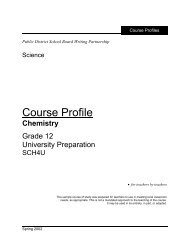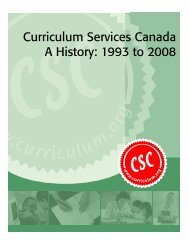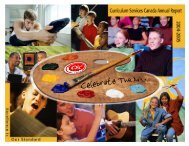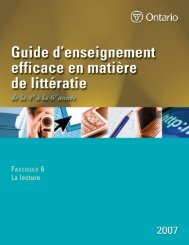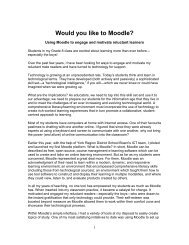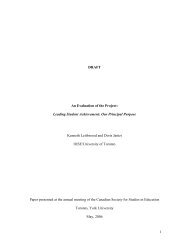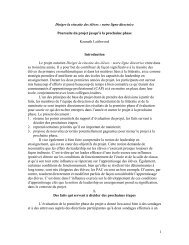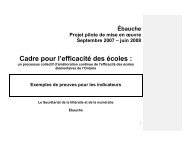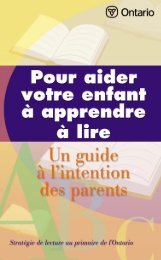Course Profile - Curriculum Services Canada
Course Profile - Curriculum Services Canada
Course Profile - Curriculum Services Canada
Create successful ePaper yourself
Turn your PDF publications into a flip-book with our unique Google optimized e-Paper software.
Websites<br />
http://www.lynchmultimedia.com<br />
The Folger Shakespeare Library – www.folger.edu.education/teaching/html<br />
(This website has resources created by classroom teachers for a wide range of plays and historical<br />
information. Refer to Lesson 155 on the language of courtly love, Lesson 183 about arranged marriages<br />
in the 17th century, Lesson 151 about child-parent relationships, and Lesson 6 for visualizing<br />
Shakespearean plays.)<br />
www.absoluteshakespeare.com<br />
(This website contains information about Shakespeare and his literary works. It answers many questions<br />
students may have about his personal life.)<br />
www.britishtheatretqn.com<br />
www.online-literature.com<br />
www.rdg.ac.uk/globe<br />
(This website is sponsored by the University of Reading and has resources for understanding<br />
Shakespeare’s Globe Theatre and its reconstruction.)<br />
www.rennaisance-faire.com<br />
www.shakespeare.palomar.edu/<br />
(This website is regularly updated with information about Shakespeare’s life and times. Use of key<br />
visuals makes information accessible. Quizzes are included.)<br />
www.shakespeare-online.com/biography<br />
Activity 2: Will’s World – Reading about the Social, Historical,<br />
and Cultural Dynamic<br />
Time: 3 hours<br />
Description<br />
Students read about the socio-cultural and historical contexts of Shakespeare’s time. Through reading<br />
comprehension and note-taking activities, students learn about infinitives. Students write summary<br />
paragraphs and study vocabulary. Their knowledge is assessed through a content quiz.<br />
Strand(s) & Learning Expectations<br />
Reading<br />
EREV.05 - use independently a variety of strategies to build vocabulary;<br />
ERE1.01 - use knowledge of personal, historical, and cultural backgrounds of authors and audiences to<br />
explain themes, situations, and characters represented in texts;<br />
ERE2.01 - use a variety of strategies to determine the meaning of unfamiliar words;<br />
ERE3.03 - use reading strategies effectively before, during, and after reading and explain their use to<br />
others.<br />
Writing<br />
EWRV.01 - write in a variety of forms, adopting a voice suitable to the intended audience;<br />
EWR1.03 - write to analyse, interpret, and evaluate information and ideas;<br />
EWR3.03 - use appropriately, and with a high degree of accuracy, complex syntactical structures such as<br />
the infinitive and/or the gerund as object.<br />
Unit 3 – Page 4<br />
• Bridge to English – Open



